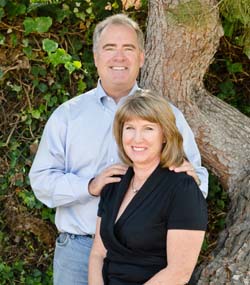 |
 |
| current issue |  | past issues |  | send a letter/news |  | address update |  | advertise |  | about us |  | alumni home |
Features
|
Robert A. Stern '79 and Roxanne Rorer Stern '77 Sold Micrus Endovascular for $500 million; his new startup, Vascular Dynamics, tackles hypertension By Beth Brosnan |
Easy to print version |

|
In 1979, Robert A. Stern '79, a freshly minted Whittemore School grad, decided to light out for the territories—namely, Albuquerque, N.M. "I threw all my stuff in the car and drove out west, with maybe $200 in my pocket and no real plans," he recalls.
Looking back, Bob Stern allows it wasn't the most strategic of moves: New Mexico, he soon discovered, wasn't then a fertile environment for would-be entrepreneurs. But that's probably one of the few false starts Stern has ever made. Over the course of his 20-plus years as an innovative health-care technology entrepreneur, Stern has shown a talent for both startups and turn-arounds, for recognizing rare opportunities and solving seemingly intractable problems.
Underlying all of Stern's endeavors is his outsize capacity for hard work. Within a dozen years of his arrival in Albuquerque, he had—together with his wife, Roxanne Rorer Stern '77, also a Whittemore grad—launched a profitable brokerage and investment firm, which they later sold to Paine Webber; helped open and operate a successful resort hotel; started a restaurant near the University of New Mexico (where he later picked up his MBA) and started a family.
Then, in 1991, he joined with radiopharmaceutical pioneer Buck Rhodes to found the biotech firm RhoMed. The company's very first product cut the time it took to diagnose fevers of unknown origin from three days to less than 15 minutes—an invaluable tool in the treatment of immuno-depressed patients.
|
"You have to really believe in what you're doing, because that's what helps you overcome all the obstacles. You have to make a difference, and you have to find an unmet need. If you can do those things, you're going to be fine." —Robert Stern '79 |
"That was a real learning experience," Stern says now, "because it took a lot of hard work and a lot of money, which was difficult to raise from New Mexico." An even more valuable lesson was the discovery that to succeed as an entrepreneur, "you have to really believe in what you're doing," he says, "because that's what gets you out of bed in the morning and helps you overcome all the obstacles you encounter. You have to make a difference, and you have to find an unmet need. If you can do those things, you're going to be fine."
Stern, whose father suffered a debilitating hemorrhagic stroke when he was just 40, has a special stake in meeting unmet health-care needs. After close to five years with RhoMed, he became VP/CFO of InnerDyne, a medical device maker located in the heart of Silicon Valley. "That was my entry into an arena where it was more easy to raise capital," he says, "a place where new ideas can be brought through a [startup] process very quickly and efficiently." Today, the Sterns live in Los Altos, Calif., "about six miles from Sand Hill Road, which, from an entrepreneurial viewpoint, is the center of the universe."
In 2004, Stern was brought in as a "firefighter" CFO for Micrus Endovascular, a struggling San Jose medical technology company. After dealing with various crises, Stern, now the COO, focused the company tightly on treating the very condition that had disabled his father: developing micro-coils and other devices used in the noninvasive treatment of cerebral aneurysms. In the process, he and his team took the company from fewer than 40 employees to 400, increased revenues from $15 million to $100 million, and last year sold Micrus for a half-billion dollars.
That's an outcome that no doubt delighted his investors, but for Stern, it wasn't necessarily the best part. "We developed products that save lives every day," he says—and, as the saying goes, that's priceless.
The same mission underlies Stern's latest venture: a startup, Vascular Dynamics, that is developing an alternative therapy for drug-resistant hypertension. "It's a bilateral implant that goes in the carotid sinus on both sides of the neck, reducing the patient's blood pressure," he explains. "For people whose hypertension has not responded to medication, this could be potentially significant. If you drop blood pressure by 20 points, you reduce the risk of death by 50 percent." The company has been in "stealth mode" in Israel for the past three years; Stern is now preparing to bring it to the States "with some of the same team that commercialized many of the products at Micrus. We've done this before, and it's great to leverage that experience."
And if there are some seemingly insoluble problems along the way, Stern is ready for them. "If there's one thing I've learned," he says, "it's persistence." Then again, he had a great teacher: "My dad was really dealt a bad set of cards, and he kept going. Obstacles will arise every day. It's your job to continuously overcome those things and find solutions."
There's one other need that Stern would like to meet: helping mentor today's young entrepreneurs, starting while they're still in college—so they can skip the false starts and hit the ground running. It's crucial, he says, "to introduce students to working entrepreneurs, people who've been there and done that, and to develop a more formal process to help them understand how to take what they're passionate about, and then learn how to turn it into business." To teach them, in short, how to make a difference.
Easy to print versionBack to "They've Been There"
blog comments powered by Disqus
